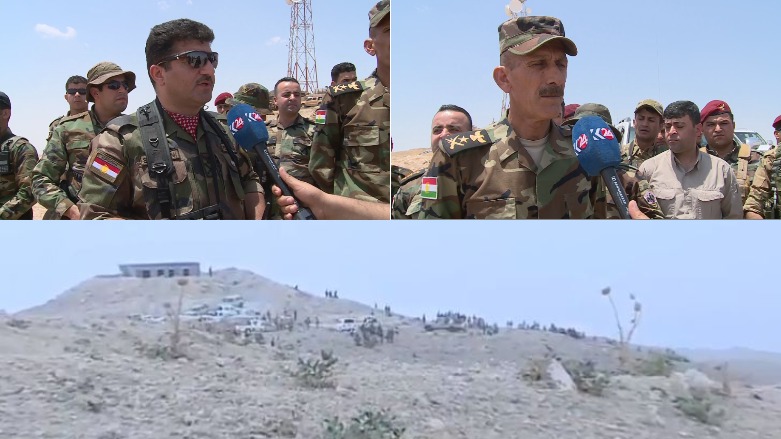No plans to work with Iraqi security forces despite Makhmour operation: Peshmerga commander
Senior Peshmerga commanders deny cooperating directly with Iraqi forces in military campaigns against the Islamic State despite launching a major US-backed joint-operation in Makhmour.

ERBIL (Kurdistan 24) – Senior Peshmerga commanders on Monday denied Kurdish forces cooperating directly with Iraqi forces in military campaigns against the Islamic State (IS) despite launching a major US-backed joint-operation in Makhmour.
“At 03:00 a.m. [Monday] Global Coalition warplanes targeted IS positions on Mt. Qarachukh in Makhmour ahead of a multi-pronged Peshmerga-ISF ground operation coordinated through,” the Kurdistan Region Security Council announced on Monday.
Peshmerga Commander of the Gwer-Makhmour front, Sirwan Barzani, however, in an interview with Kurdistan 24, stressed the operation was in coordination with Coalition elements, not Iraqi security forces.
“For the past month and a half” the Peshmerga forces and the Coalition have been engaged in “intelligence gathering” operations, where they had “found tunnels and hideouts that [IS] was using,”
The multi-pronged operation, with Kurdish forces southwest of Erbil and Iraqi forces on the eastern side of the mountain, aims to drive out remnant Islamic State (IS) members in the area with the support of the US-led coalition.
“IS activities are numerous in this area as it is easy for them to take advantage of the [security] vacuum that exists between us and Iraqi forces,” said Barzani.
The vacuum was formed after cooperation between the Iraqi and Kurdish forces collapsed following the Kurdistan Region’s referendum on independence and the ensuing attack by Iranian-backed Shia Hashd al-Shaabi militias and Iraqi army on disputed territories, driving out Peshmerga forces. Since then, the security situation has deteriorated in areas previously under the protection of the Peshmerga and IS sleeper cells have re-emerged, generating fears of an insurgency.
According to Barzani, the operation included coalition’s advisers, as well as “Special Forces who also participated directly; among them were Canadian, American [US], and Belgian troops.”
He made clear there were no plans for any future joint Kurdish-Iraqi security forces’ effort to rid the area of IS remnants.
“The mountains here [Qarachukh] are under the Peshmerga’s control, and the areas down there [at the foot of the mountain] belong to the Iraqi forces.”
“Due to the small size of their forces present, they cannot cover the whole area, and naturally, they mostly guard the main roads.”
Barzani explained Iraqi forces were tasked with “protecting the villages in their territory” by staying on guard and “capturing or killing fleeing IS fighters.”
The coalition had “informed them [of the impending operation], and in response, they increased their numbers and reinforced their outposts.”
“The regions where IS elements are active lie mostly in Makhmur and Qarachukh” and the terrain makes it hard for Iraqi forces to “clear the area of IS,” the Kurdistan Regional Government's (KRG) Chief of Staff of the Peshmerga Forces, Jamal Eminki, told Kurdistan 24.
“In Peshmerga-controlled areas, there are no movements [by the Islamic State] anymore.”
Eminki also asserted Erbil and Baghdad have yet to reach an agreement on the renewed security cooperation between Iraqi and Kurdish forces, notably in the province of Kirkuk.
“There have been no talks or deals between the Ministry of Peshmerga and Iraq’s Ministry of Defense.”
“Peshmerga forces, however, remain on standby” at outposts near territories suspected of harboring IS sleeper-cells, Eminki reassured.
The Makhmour joint-operation began early Monday morning and finished early afternoon.
Editing by Nadia Riva
